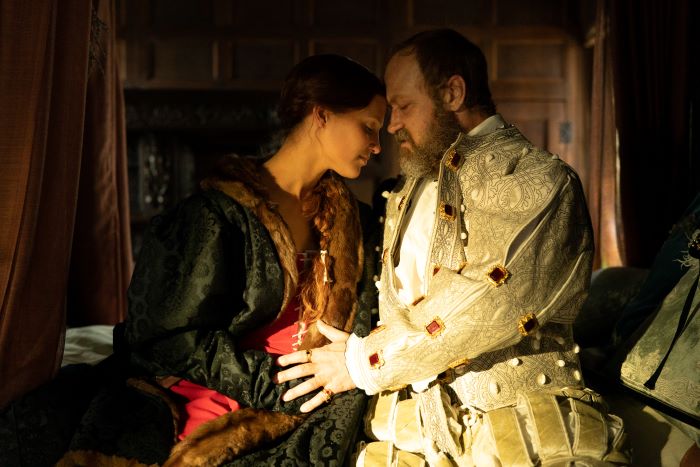“Henry VIII had six wives. One survived.” So reads the catchy marketing tagline for Brazilian director Karim Aïnouz’s English-language debut. But much like Firebrand, an uneven period drama about the Tudor monarch’s final spouse, this promo plays fast and loose with the historical record. The last woman standing was not Katherine Parr but Anne of Cleves, Henry’s fourth wife, who outlived her former husband by 10 years.
Adapted from Elizabeth Fremantle’s 2012 novel Queen’s Gambit, the film declares its revisionist and feminist intent in its opening title card, that history is written primarily about men and war, but “for the rest of humanity, we must draw our own—often wild—conclusions.” The man in this historical case, Henry (Jude Law), is on a military campaign in France when the movie opens. Fleeing the plague in London, the royal court has settled in a remote castle in Derbyshire (filmed at Haddon Hall). Appointed regent in his absence, Katherine (Alicia Vikander) oversees a privy council, affectionately parents her three stepchildren—Princess Elizabeth (Junia Rees), Princess Mary (Patsy Ferran), and Prince Edward (Patrick Buckley)—and pens a devotional book in her own name, the first English woman to do so.
She also secretly visits her friend, the poet and Protestant preacher Anne Askew (a fiery Erin Doherty), whose protest against the ban of English-language Bibles has drawn the ire of the church establishment. Henry may have broken away from Rome, but his Church of England retains its Catholic roots, including services in Latin. Sympathetic to the burgeoning English Reformation, Katherine believes God chose her to change the king’s mind. Anne is more realistic: “Do you think that is all God has planned for you?”
Katherine soon finds out when her husband returns from France. Affectionate at first (he gives her a beautiful macaw), Henry asks Katherine if she enjoyed being regent and suggests she not worry her pretty little head about such matters anymore. Yet as his mental instability and paranoia increase—exacerbated by a painful, festering leg wound (photographed in gruesome detail) and the political machinations of Bishop Stephen Gardiner (Simon Russell Beale) and the hirsute Seymour brothers (Eddie Marsen, Sam Riley)—their marital relationship becomes tense and abusive. Scenes of Katherine enduring bad sex with the corpulent and physically repellent Henry and the shots of his naked buttocks will make viewers squirm.
The decision by the director and the screenwriters to condense and confine most of the historical action to the quarantine castle (whose inhabitants practice very little social distancing) effectively creates a claustrophobic, fearful mood that vividly captures life under an unpredictable, tyrannical monarch. But it also undermines the script’s premise of Katherine Parr as a radical, “you-go-girl” progressive reformer. In the first 20 minutes, Vikander’s performance is self-assured and bold, yet when Katherine confronts Henry about his decision to execute her friend Anne, she crumbles in the face of his rage and the actor’s interpretation becomes muted until the startling final scene that will have historical purists pulling their hair. It doesn’t help that Vikander is overshadowed by Law, who embraces the boorish king’s many disgusting flaws with gusto.
While director of photography Hélène Louvart composes lovely images that would make Hans Holbein proud and costume designer Michael O’Connor dresses the actors in lavish period costumes and headgear, the film fails to capture the political and religious fervor of the times. Viewers unfamiliar with the English Reformation will be confused as the historical context is barely sketched in. One wonders why the filmmakers didn’t focus on the true firebrand here, Anne Askew. The details of her remarkable life provide enough drama for a compelling feminist film without unnecessary and false revisionism. You go, girl!

















Leave A Comment